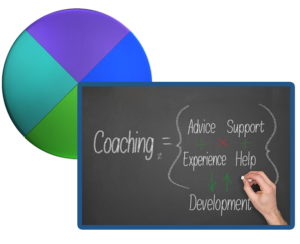Performance Solutions
Appreciative Inquiry
 Appreciative inquiry is a combination of social construction theory and strength theory that has resulted in a re-visioning of assumptions about change and how it takes place in organizations. With the inception of appreciative theory and practice in the last quarter of the 20th century, a broad spectrum of social systems has witnessed a shift from a sole emphasis on problem solving to one of embracing solutions.
Appreciative inquiry is a combination of social construction theory and strength theory that has resulted in a re-visioning of assumptions about change and how it takes place in organizations. With the inception of appreciative theory and practice in the last quarter of the 20th century, a broad spectrum of social systems has witnessed a shift from a sole emphasis on problem solving to one of embracing solutions. Mary Ann Rainey, working with David Cooperrider and John D. Carter, was project manager for the first application of appreciative theory as an organizational change methodology.
The ultimate goal of AI is to galvanize the entire system through total system participation and engagement. Clients realize that the simple introduction of the principles of AI--Constructionist, Simultaneity, Open Book “Poetic Principle,” Anticipatory, and Positive--can create a climate of collaboration, optimism, and empowerment among employees that is powerfully transformative.
AI education or training follows the AI 4-D Model: Discovery, Dream, Design, and Destiny. Services are customized in alignment with philosophical underpinnings of AI and client designed outcomes.
Executive Coaching
 Our executive coaching is designed to be a customized developmental experience for senior to executive level leaders who have taken on a new role, must broaden their scope of responsibility, increase their leadership capability, or expand their leadership presence.
Our executive coaching is designed to be a customized developmental experience for senior to executive level leaders who have taken on a new role, must broaden their scope of responsibility, increase their leadership capability, or expand their leadership presence.
With the support of a competent and experienced coach, one-on-one sessions take place either face-to-face or virtually. Self-awareness and personal presence are core components of our work and, as clients can attest, deliver effective results.
MA Rainey Associates's executive coaching is assessment based, goal driven, and involves on-going feedback and experimentation. It can extend from 6 to 18 months depending on desired outcomes.
Gestalt Practice in Organizations Education and Training
 The operational principle of Gestalt practice is unified whole. The word "Gestalt" [gə'∫ta:lt] refers to the configuration or pattern of a set of elements: the essence and shape of an entity’s complete or whole form that is different and distinct from the sum of its parts.
The operational principle of Gestalt practice is unified whole. The word "Gestalt" [gə'∫ta:lt] refers to the configuration or pattern of a set of elements: the essence and shape of an entity’s complete or whole form that is different and distinct from the sum of its parts. The Gestalt stance is a wholistic and integrated perspective that supports development at all levels of the organization. Gestalt interventions rest on the power of the practitioner’s awareness, use-of-self and personal presence. Our Gestalt training programs are customized to meet client desired outcomes and include:
- Use of Self and Personal Presence. Customized one- to three-day workshop on self as an instrument of change. The primary objective is increasing self-awareness and expanding the range of personal presence. The course examines how leaders and practitioners act upon values, feelings, observations in order to improve the functioning of their client systems.
- Introduction to Gestalt Practice in Organizations. Four- or five-day training program that provides the foundations of Gestalt practice in organizations. Course context includes an overview of Gestalt theory and practice, use-of-self and presence, basic skill training in applying Gestalt perspectives at multiple levels of system, and navigating change in large complex systems.
- iGold Program (International Gestalt Organization and Leadership Development Program): Customized three- to five-module, in-depth education and training program for a cohort of 18-36 participants. The course covers all things Gestalt and results in elevated practitioner skill and competence in use-of-self and presence. Expanded content covers Gestalt theory and basic skill training in applying Gestalt perspectives at multiple levels of system. Sessions are devoted to the Gestalt approach to coaching, conflict management and building trusted partner relationships, developing teams that WORK, and intervening in large, complex social systems.
Leadership Effectiveness
 Our leadership effectiveness consulting is guided by Relationship-Strategy-Vision-Performance (RSVP) Fundamentals. The RSVP Fundamentals of Leadership Model was developed by Mary Ann Rainey and David A. Kolb. The authors firmly believe the adaptive ability necessary for success in today’s rapidly changing environment requires leaders who are willing to engage in continuous learning.
Our leadership effectiveness consulting is guided by Relationship-Strategy-Vision-Performance (RSVP) Fundamentals. The RSVP Fundamentals of Leadership Model was developed by Mary Ann Rainey and David A. Kolb. The authors firmly believe the adaptive ability necessary for success in today’s rapidly changing environment requires leaders who are willing to engage in continuous learning. The RSVP Model identifies the primary components of a holistic and integrated approach to leadership that is consistent with experiential learning theory (Kolb, 1984): Relationship Mastery, Strategy Mastery, Vision Mastery and Performance Mastery. Effective leadership necessitates competence in all four areas to steer organizations through the myriad of adaptive challenges they face in the world today.
An assessment process identifies the areas of strength and development that will guide a consulting or custom training program.
Organization Effectiveness Consulting
 Organization Effective (OE) Consulting involves working with organizations to clarify purpose and goals and to achieve those goals while maintaining healthy relationships among organizational members and other key stakeholders. Attention is given to both organizational and human needs through: (1) scientific inquiry that is practical and applicable, (2) adhering to a democratic process, and (3) developing a collaborative client-consultant partnership.
Organization Effective (OE) Consulting involves working with organizations to clarify purpose and goals and to achieve those goals while maintaining healthy relationships among organizational members and other key stakeholders. Attention is given to both organizational and human needs through: (1) scientific inquiry that is practical and applicable, (2) adhering to a democratic process, and (3) developing a collaborative client-consultant partnership. Organizational Effectiveness consulting is similar to Organization Development (OD) consulting but can be distinguished from expert or technical consulting. In OE, task issues are addressed less through what the task is (a new technology system, job redesign, restructuring) and more through how the task is accomplished (clarifying goals, roles, and work processes) and relationships are maintained. MRA services include the following, in combination or alone.
Team Building
 Our team building process is designed to help members of a group work more collaboratively together to achieve shared goals and maintain an environment of support and trust. Self-awareness is a by-product of team development.
Our team building process is designed to help members of a group work more collaboratively together to achieve shared goals and maintain an environment of support and trust. Self-awareness is a by-product of team development. We encourage members to learn about their personal assumptions, tendencies and biases in group settings. Interpersonal skills are sharpened as members enhance their ability to give and receive feedback.
Team building interventions are led my highly trained consultants who are knowledgeable and competent in group process and development, communications, decision making, conflict, diversity, and issues of leadership, power and authority. Consulting and education programs are customized to meet client desired outcomes.
